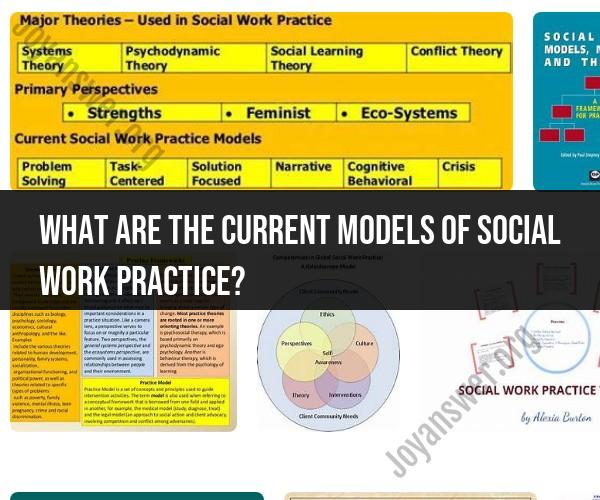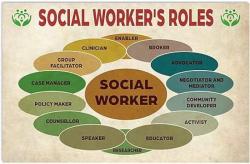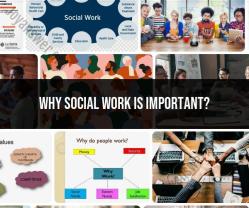What are the current models of Social Work Practice?
Social work practice encompasses a range of models and approaches, with practitioners employing different methods to address the needs of individuals, families, and communities. The choice of model often depends on the specific context, client population, and the social worker's training and expertise. Here's an overview of some contemporary models of social work practice:
Strengths-Based Practice: This model focuses on identifying and utilizing the strengths, resources, and resilience of individuals and communities. Social workers using this approach emphasize a client's assets rather than deficits to promote empowerment and positive change.
Crisis Intervention Model: This model is used when individuals are in crisis, facing immediate and severe emotional, psychological, or situational distress. Social workers provide immediate support, assess the crisis, and work on stabilizing the situation.
Cognitive-Behavioral Therapy (CBT): CBT is often integrated into social work practice to address behavioral and emotional issues. It helps individuals identify and modify unhealthy thought patterns and behaviors to achieve positive outcomes.
Psychoanalytic or Psychodynamic Model: Drawing from Freudian principles, this model explores the unconscious mind to understand how past experiences influence a person's current behavior, emotions, and relationships.
Trauma-Informed Care: This model recognizes the widespread impact of trauma on individuals and emphasizes the importance of creating safe and supportive environments to promote healing and recovery.
Narrative Therapy: This model helps individuals reframe their personal narratives and stories, empowering them to reinterpret their experiences in a more positive and constructive light.
Solution-Focused Brief Therapy (SFBT): SFBT is a goal-oriented, short-term model that helps clients identify and work towards solutions to their problems rather than delving deeply into the issues themselves.
Ecological Systems Theory: This model, associated with the work of Urie Bronfenbrenner, examines the individual within various systems and contexts (micro, meso, exo, macro, and chrono systems). It emphasizes the impact of environment on human development and functioning.
Feminist Social Work: This model focuses on addressing the impact of gender and gender inequality on social issues. It seeks to empower individuals, especially women, to challenge and change oppressive structures and systems.
Humanistic or Person-Centered Approach: This model, influenced by Carl Rogers, emphasizes the importance of empathy, unconditional positive regard, and genuineness in the therapeutic relationship.
Motivational Interviewing: Often used for issues related to substance abuse and behavior change, this model helps clients explore their own motivations and ambivalence towards change, fostering self-motivation.
Transpersonal Social Work: This model combines traditional social work with spiritual and holistic approaches, recognizing the interconnectedness of mind, body, and spirit in individuals and communities.
Empowerment Model: This model promotes the empowerment of marginalized or oppressed groups by helping them develop skills, gain knowledge, and advocate for their rights and needs.
Intersectional Approach: Recognizing that individuals hold multiple intersecting identities (e.g., race, gender, sexuality), this approach considers how multiple forms of oppression and privilege influence a person's experiences and needs.
It's essential for social workers to be versatile and adapt their practice to meet the unique and evolving needs of their clients. Often, an eclectic approach that combines elements from various models is used to create a tailored intervention that best serves the client's circumstances. Social work practice continues to evolve as new research, societal changes, and client needs emerge.
Current Models of Social Work Practice: An Overview
Social work practice models are frameworks that guide social workers in their work with clients. They provide a roadmap for social workers to assess client needs, develop interventions, and measure progress. There are many different social work practice models, each with its own unique strengths and weaknesses.
Some of the most common social work practice models include:
- Problem-solving model: This model focuses on helping clients identify and solve their problems.
- Task-centered practice: This model focuses on helping clients complete specific tasks, such as finding a job or housing.
- Solution-focused therapy: This model focuses on helping clients find solutions to their problems, rather than dwelling on the past.
- Narrative therapy: This model helps clients to re-frame their stories in a way that is more empowering and hopeful.
- Cognitive behavioral therapy (CBT): This model focuses on helping clients identify and change negative thoughts and behaviors.
Modern Approaches to Social Work Intervention
Modern approaches to social work intervention are increasingly focused on:
- Evidence-based practice: This approach to social work intervention relies on research evidence to support the effectiveness of interventions.
- Person-centered practice: This approach to social work intervention focuses on the client's unique strengths and perspectives.
- Strengths-based practice: This approach to social work intervention focuses on the client's strengths and abilities, rather than their weaknesses.
- Trauma-informed practice: This approach to social work intervention recognizes that many clients have experienced trauma, and that their trauma can impact their behavior and well-being.
Evidence-Based and Person-Centered Models in Social Work
Evidence-based and person-centered models in social work are two of the most important approaches to social work intervention. Evidence-based practice ensures that social workers are using interventions that have been shown to be effective in research studies. Person-centered practice ensures that social workers are respecting the client's autonomy and focusing on the client's unique needs and perspectives.
Integrative and Multidimensional Models in Social Work Practice
Integrative and multidimensional models in social work practice recognize that clients' needs are complex and that no single intervention is likely to be effective for all clients. Integrative models combine elements from different social work practice models to create a tailored approach for each client. Multidimensional models address the client's needs on multiple levels, such as the individual, family, community, and societal levels.
Ethical Considerations in Contemporary Social Work Models
Social workers must always consider ethical considerations when using any social work practice model. Some of the most important ethical considerations in contemporary social work models include:
- Client autonomy: Social workers must respect the client's right to make their own decisions.
- Client confidentiality: Social workers must keep the client's information confidential.
- Social justice: Social workers must work to promote social justice and equity.
Conclusion
There are many different social work practice models, each with its own unique strengths and weaknesses. Social workers must choose the model that is most appropriate for the client's needs and the social worker's own skills and experience. Social workers must also consider ethical considerations when using any social work practice model.













